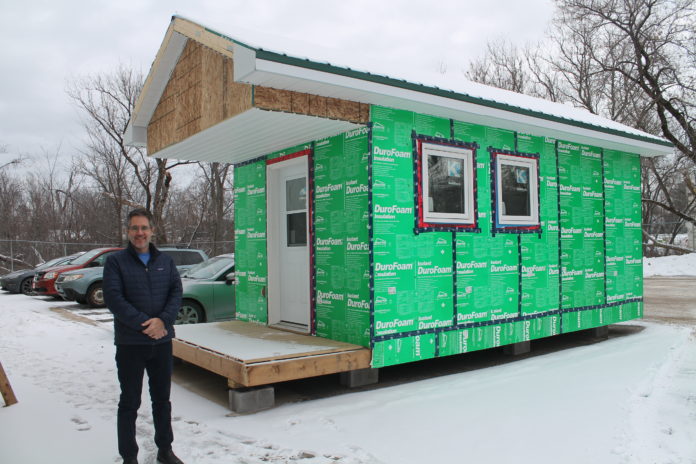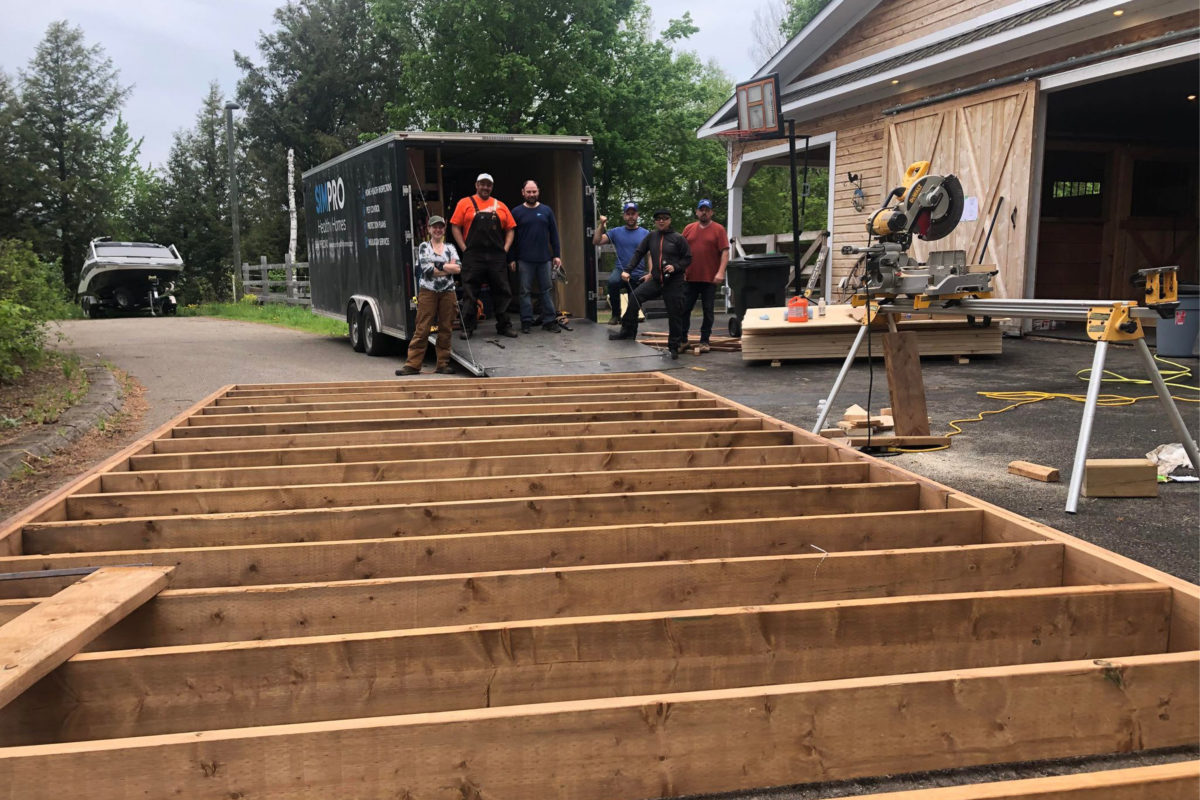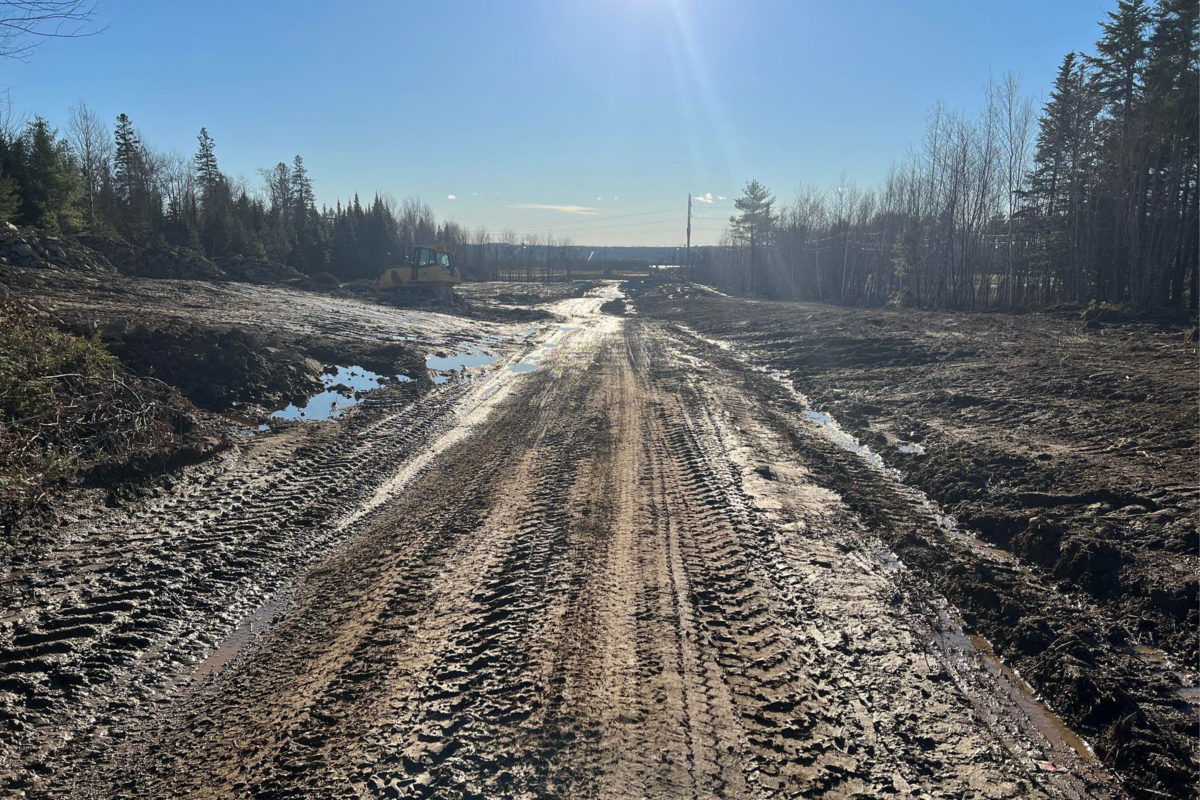

In early October last year, a new community began to take shape on a vacant lot on Fredericton’s Northside.
The city’s first collection of affordable micro-homes emerged from the vision of Marcel LeBrun, a technology entrepreneur who is determined to find a better way to address chronic homelessness in his community.
After years of studying various development models, LeBrun began to develop and construct his vision that he calls the 12 Neighbours Community.
In January, their first community members moved into their new home, leaving the tent where they resided. The third residents, a couple who struggled with homelessness for about five years and long-term hotel stays, now spend their days lounging on the deck of their tiny home.
Today, there are six homes occupied with either couples or single individuals with a goal to build three new homes a month. Every resident will be surrounded by 12 neighbours, creating mini-communities.
“I want to prove that people who are poor and marginalized actually know how to move forward with their lives if you can invest in them,” said LeBrun. “When you start to succeed, you unlock more investment, not less. But in a poor circumstance when you start to succeed, your supports disappear.”
At the University of New Brunswick, he studied electrical and computer engineering sparking his interest in software engineering. He became a software engineer creating start-ups and software companies.
His most recent company was Radian6, founded in 2006 and launched in 2007 — a social listening tool dedicated to listening, analyzing and engaging information shared publicly online. After significant growth, Radian6 was acquired by Salesforce.com in May 2011. In its day, it was the largest venture-backed technology exit in Canada and won the Canadian Venture Capital Association’s “Deal of the Year” award for investment success.
LeBrun and his other two co-founders received Ernst & Young, Entrepreneur Of The Year. In 2015, he left his high-profile company to choose his next steps focused on his interest in complex problems.
He connected his decision with a Henry David Thoreau quote: “The price of anything is the amount of life one is willing to exchange.”

Thoreau’s words emphasize the inability to control life’s direction while on a journey of self-awareness and appreciating simplicity. Like Thoreau, LeBrun felt he exchanged a lot of life for his start-ups and was ready for his next path.
“People ask the question sometimes when you’re a kid ‘if you could do anything you want, what would you do?’”
LeBrun found himself in a position where that question was no longer theoretical, but a reality. He asked himself, “what should I spend my money on?”
Although not a lifelong person of faith, it became a significant part of his life throughout his time at university. Isaiah 58:3 outlines a conversation between God and people behaving in ways they felt He would want.
“God replies and says, ‘you’re fasting and praying but while you do that, you’re oppressing your workers, you’re fighting with one another and you’re kind of missing the whole point,” LeBrun said. “He said ‘I want you to spend yourself on behalf of the oppressed.’”
Those words stuck out to LeBrun, shifting the question of how he should invest his money to “how do I spend myself and what does that actually mean?”
“That began my journey.”
During that same time in 2015, LeBrun became more personally involved in various initiatives related to poverty. He volunteered at the multicultural association, working alongside the sixth Syrian family to move to Fredericton and evolved his knowledge by reading about leaders in creating change.
He found himself confronted with the concept that as a society, emergency relief gets done quite well, whereas creating changes for long-term development is done poorly. From the government to non-profit sectors, he believes the systems for support carelessly propagate poverty.
He began exploring this deeper and questioned when help could actually result in hurt. That curiosity pushed him to research, where he discovered most investments that go into poverty relief tend to fall short in the long run. LeBrun wondered who is doing the best work in the world that results in permanent transformation and the keys to success.
LeBrun hired a group of young students to partake in research with him. They studied 300 organizations, then 30 and eventually weeded down to 10, where he visited and filmed some of his experiences. He used his experiences to learn the building blocks of long-term change but feared creating something well-intended but not at the root of what was needed.
For five to six years, LeBrun worked towards his goal of impactful change. The 12 Neighbours Community was his attempt to synthesize all that he learned in each place and apply it to his community. When describing the pillars the community sits on, LeBrun uses three words: Dignity, community, and opportunity.


He believes the most valuable gift someone can give another is helping them re-discover their dignity and story — something 12 Neighbours offers.
“We don’t give them dignity; they have it. We just have to remind them where they put it.”
He witnessed that in most situations, the notion of a community could heal better than most professionals.
The vision for their Social Enterprise Center, estimated to be constructed this year, is creating a patient path to employment and guiding people to pursue opportunities incrementally. It will provide residents a catalyst for personal and community development — offering techniques to develop workplace skills, progress and earn and save money. The centre will also offer space for external support such as art therapy, counselling and recovery programs.
The centre will be made up of three businesses: a café with coffee and treats, the art and apparel shop where residents can sell their artwork to the public and the tiny home factory where they will fabricate homes for the community and for sale.
When the 12 Neighbours community has a home available, they contact social development to select individuals they categorize as “high priority” on the by-names list. Those selected can view the tiny home to decide if it is a proper fit for them and if it is, they will have their rent subsidized by social development and the province.
LeBrun feels that a community like Fredericton shouldn’t have chronically homeless individuals. He feels there is a need for a shift in mindset. Many view homelessness as the result of a drug or mental health issue, but in reality, it is a housing and homelessness problem.
He said, looking at the statistics, 95 per cent of people with substance-use issues are housed and 95 per cent of people with mental health issues are housed.
The government may offer a “safety net,” but LeBrun feels support is only available when one showcases their deficits and with progression, support disappears.
“What happens is you have all these things systemically, which kind of keep you stuck where you are,” LeBrun said. “I want to show that with the right developmental support, people know what to do, and what I’d love to see is that people in our community are moving ahead from a tent to a job, independence and taking care of themselves.
“I’d like the by-names list to get to zero in the city.”
